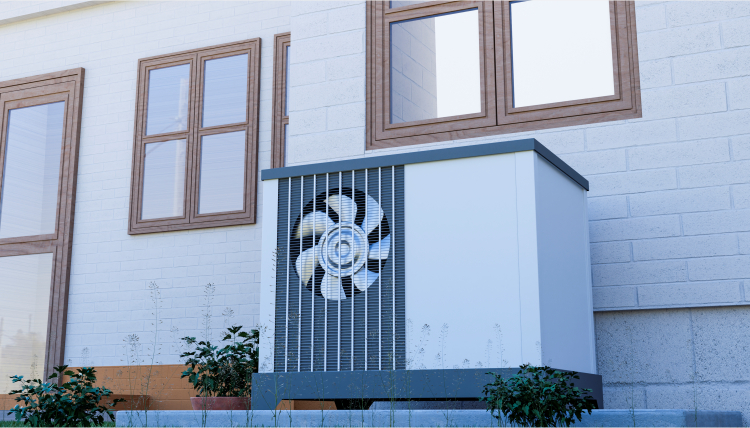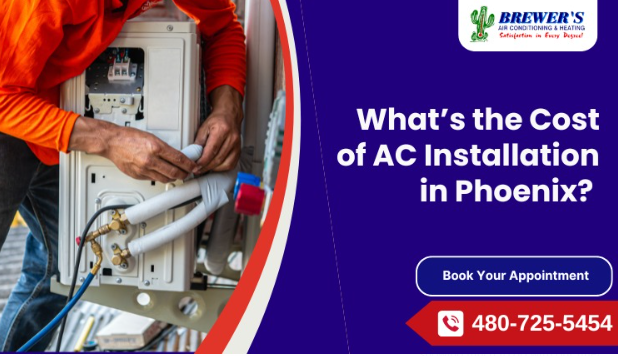
Air conditioners are common in US homes. Nearly 75% of homes have some type of air conditioning. According to the U.S. Department of Energy, air conditioner usage amounts to about 6% of total electricity produced in the country. This translates to about $29 billion in energy costs. Choosing the right air conditioning system is crucial. It affects your home’s cooling, comfort, and energy consumption. There are several types of air conditioners, each
with its own pros and cons.
Here’s a guide by Brewer’s Air Conditioning and Heating to help you make an informed decision.
Popular Air Conditioning Options
1. Central Air Conditioner
Central air conditioners are ideal for large homes. They cool multiple rooms at once. This system uses a split design with an outdoor unit and an indoor unit. It works through ducts in your home. Central ACs can pair with smart thermostats for added convenience.
Advantages:
- Cools multiple rooms quickly.
- Reduces humidity.
Disadvantages:
- High energy consumption.
- Duct issues can reduce efficiency.
2. Ductless Mini-Split
Ductless mini-splits offer great efficiency. They are perfect for cooling specific areas. Each room gets its own unit, which can be controlled individually.
Advantages:
- Easy to install.
- Individual temperature control.
Disadvantages:
- Not suitable for large homes.
- Wall-mounted units are visible.
3. Window Air Conditioner
Window air conditioners are great for cooling single rooms. They are compact and easy to install.
Advantages:
- Affordable.
- Simple to maintain.
Disadvantages:
- Can be noisy.
- Blocks window view.
4. Portable Air Conditioner
Portable air conditioners are versatile. They can be moved from room to room. They need a power outlet and a window for ventilation.
Advantages:
- Easy to set up.
- Portable and flexible.
Disadvantages:
- Noisy operation.
- Not effective for large rooms.
5. Floor-Mounted Air Conditioner
Floor-mounted ACs are ideal for spaces with limited wall space. The indoor unit rests on the floor.
Advantages:
- Easy access for filter cleaning.
- Quick cooling.
Disadvantages:
- Obstructed airflow if placed near furniture.
- Not ideal for large rooms.
6. Smart Air Conditioner
Floor-mounted ACs are ideal for spaces with limited wall space. The indoor unit rests on the floor.
Advantages:
- Convenient and energy-saving.
- Enhanced comfort features.
Disadvantages:
- More expensive.
- Requires Wi-Fi.
7. Geothermal Air Conditioning System
Geothermal systems use the earth's stable temperature for heating and cooling. They are energy-efficient and have a long lifespan.
Advantages:
- Highly efficient.
- Long-lasting.
Disadvantages:
- High installation cost.
- Location-dependent installation.
8. Hybrid / Dual Fuel Air Conditioner
Hybrid systems combine a gas furnace with an electric heat pump. They switch between energy sources based on outdoor temperatures.
Advantages:
- Cost-effective.
- Reduced carbon footprint.
Disadvantages:
- High setup cost.
- Long-term savings required.
9. Evaporative Cooler
Evaporative coolers are not traditional ACs. They use water to cool the air. They are best for dry climates.
Advantages:
- Low energy consumption.
- Adds moisture to dry air.
Disadvantages:
- Not effective in humid areas.
- Requires regular water refills.
Important Factors When Selecting the Best Type of Air Conditioner for Your Home
When choosing an air conditioner, consider these factors:
- Budget: Costs range from $100 to $20,000. Window and portable ACs are cheaper. Geothermal systems are the most expensive but offer long-term savings.
- Energy Consumption: Look for energy-efficient models with high SEER or EER ratings. They reduce utility bills.
- Space Requirements: Choose an AC that fits your space. Portable units are good for apartments. Central units are best for large homes.
- Ease of Maintenance: Single-room ACs require less maintenance. Central HVAC units need professional upkeep.
- Cooling Power: Check the BTU rating. Higher BTUs mean more cooling power. Choose a unit that matches your room size.
Conclusion
Choosing the right air conditioner is essential for home comfort and energy efficiency. Consider your budget, space, and maintenance needs. Evaluate the cooling power required for your home. With this guide, you can make an informed decision and enjoy a comfortable, cool home.
Enjoy a cool and comfortable summer in Arizona! Call the best AC repair service in Mesa for more insights!











